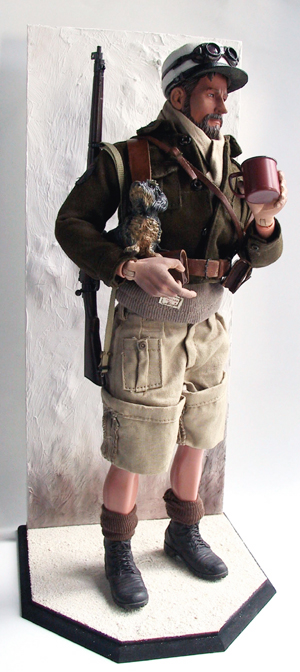|
France, once Europe's leading power, was now an abject vassal of the Third Reich. But not all Frenchmen accepted defeat, and their spirit of resistance was symbolized by a little-known Army officer and junior government minister at the time of the French surrender, Charles de Gaulle. His radio broadcast to the French people from London on 18 June 1940 struck a spark that rekindled the spirit of the nation under the flag of Free France. Slowly, small groups of French soldiers, solitary ships and remote colonies rallied to General de Gaulle. However, by 1942, a small but effective military force had been organized. Its first notable action was the heroic defense of Bir Hakeim. The Battle of Bir Hakeim (May 26, 1942 - June 11, 1942) was fought, during World War II, between the German/Italian Afrika Korps and the 1st Free French Brigade, with support from the British 7th Armoured Division. Most Legion units fought with the Free French forces in the Second World War, though some fought for Vichy and subsequently changed sides. They distinguished themselves at Narvik, in Syria against the Allies and most notably, under the French commander General Pierre Koenig, at Bir Hakeim with the British 8th Army. The Germans attacked Bir Hakeim on May 26. Over the next two weeks, the Luftwaffe flew 1,400 sorties against the defenses, whilst 4 German/Italian divisions attacked. On June 2, 3, and 5, the German forces requested that Koenig surrender, the French General refused and launched counterattacks with his Bren gun carriers. Despite the explosion of the defence's ammo dump, the French continued to fight using ammo brought in by British armored cars during the night. Meanwhile, the Royal Air Force dropped water and other supplies. On June 9, the British Eighth Army authorized a retreat and during the night of June 10/June 11 the defenders of Bir Hakeim escaped the battered claws of Rommel's Afrika Korp. Interestingly, it has been noted that among the Free French Stand at Bir Hakeim, the majority of the fiercest fighting emanated from the Foreign Legion. The Legion at Bir Hakeim counted among its ranks Germans and other nationalities who knew that to be captured by the Nazis would see them suffer a far worse death than to die fighting. |


Creating the figure
A quick bash of a WW2 French Foreign Legionaire, Bir Hakeim 1942 using BBI's excellent WW2 SAS headsculpt and figure. The scratchbuilt leather ammo pouches have been weathered, with some stitching detailing which unfortunately due to my lousy posing can't be seen at all!.
Uniform kitbashed from BBI with the tunic embellished with French Foreign Legion collar insignia and Free French insignia on the shoulders. The kepi and kepi cover are scratchbuilt and the desert scarf is a piece of light tan fabric. The German Army goggles are by BBI while the Rifle No.4 is from Dragon. The pooch is by Sclelch and came from a hobby shop.